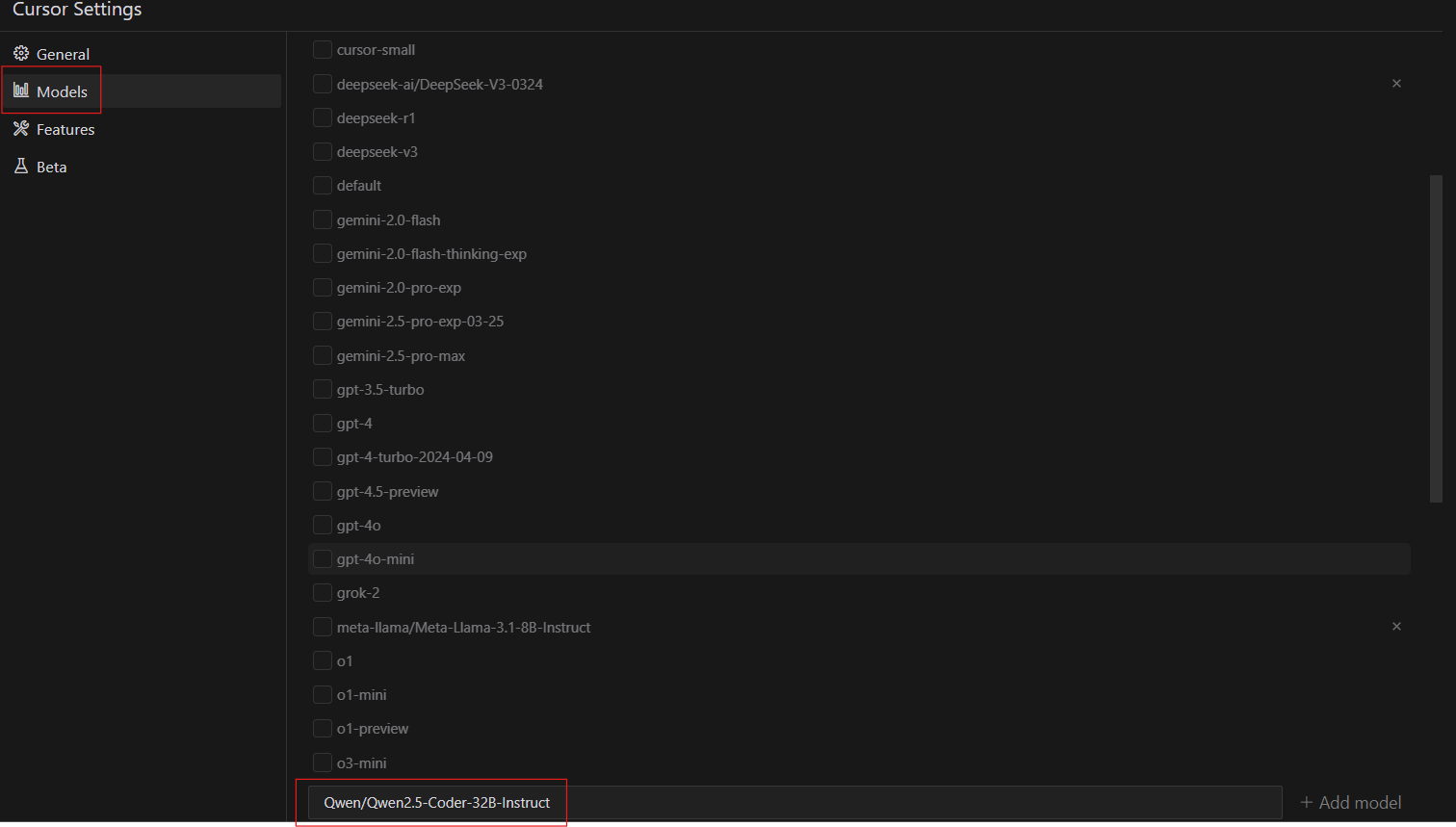Supercharging Your Development Workflow: Integrating Featherless.ai with Aider and Cursor
Connect DeepSeek V3, Qwen2.5-Coder , Openhands LM and 4000+ Open Models to Aider and Cursor Without Infrastructure Headaches

Introduction
So you’ve heard that the latest DeepSeek V3 or Openhands LM model is good at coding and now you’re wondering how to bring that power directly into your coding workflow. You’ve come to the right place, we give you access to not only the latest DeepSeek but to any open-model on Hugging Face without the headache of managing infrastructure.
This guide walks you through integrating Featherless.ai with two popular AI-assisted coding tools: Aider and Cursor. Whether you’re pair programming with an AI assistant through Aider’s command-line interface or leveraging Cursor’s intelligent code completion and refactoring capabilities. We can significantly enhance your development experience by giving you access to the latest AND any future open-source models you will want to work with.
At the end we’ll go over some of our favorite models for coding but let’s first get started with the integration process
Your Featherless API Key
You’ll need a couple of things before you start. First and foremost, you’ll need a Featherless API key to connect to any of the 4000+ open models in our catalog. Head over and create an account if you haven’t already. Once logged in, navigate to the API section in your dashboard where you can generate a new API key. This key is your secure passport to accessing all the powerful open-source models we host, including DeepSeek V3. Keep this key handy as you’ll need to configure it in both Aider and Cursor in the following steps. Remember to treat your API key like a password, don’t share it publicly or commit it to version control systems.
You will also need to choose a model in our model catalog. Let’s take the code-specific Qwen model called Qwen/Qwen2.5-Coder-32B-Instruct as an example.
Setting Up Aider with Featherless.ai
Installation
First, you'll need to install Aider if you haven't already. Aider is a command-line tool that lets you pair program with AI models directly from your terminal. Visit Aider's official documentation for the most up-to-date installation instructions.
Integrating with Featherless.ai
Once Aider is installed, integrating it with Featherless.ai requires just two configuration files in your project folder:
1. Create a model settings file named
- cache_control: false
caches_by_default: false
edit_format: whole
examples_as_sys_msg: true
extra_params:
max_tokens: 4096
lazy: false
name: openai/Qwen/Qwen2.5-Coder-32B-Instruct
reminder: user
send_undo_reply: false
streaming: true
use_repo_map: true
use_system_prompt: true
use_temperature: true2. Create a model metadata file named
{
"openai/Qwen/Qwen2.5-Coder-32B-Instruct": {
"max_tokens": 4096,
"max_input_tokens": 4096,
"max_output_tokens": 4096,
"input_cost_per_token": 0,
"output_cost_per_token": 0,
"litellm_provider": "openai",
"mode": "chat",
"support_vision": false,
"support_function_calling": false
}
}Running Aider with Featherless.ai
Now you can start Aider with Featherless.ai by running the following command in your terminal:
aider --openai-api-base 'https://api.featherless.ai/v1' \
--openai-api-key your_featherless_API_key \
--model 'openai/Qwen/Qwen2.5-Coder-32B-Instruct' \
--map-tokens 1024 \
--model-metadata-file '/path/to/.aider.model.metadata.json' \
--model-settings-file '/path/to/.aider.model.settings.yml'Make sure to:
Replace
your_featherless_API_keywith the API key you obtained from the Featherless.ai dashboardUpdate
/path/to/to the actual path where you saved your configuration filesYou can create separate configuration files for each model you want to use
That's it! You're now ready to use powerful models like Qwen2.5-Coder-32B through Aider, all powered by Featherless.ai's infrastructure.
Setting Up Cursor with Featherless.ai
Configuring Cursor to Use Featherless Models
Cursor is a powerful AI-assisted code editor that can be enhanced with custom models from Featherless.ai. Here's how to set it up step by step:
Open Cursor Settings
Launch the Cursor application
Click on the gear icon in the top right corner, or use the keyboard shortcut
Ctrl+Shift+J,(Windows/Linux) orCmd+Shift+J,(Mac)Navigate to the "Models" section in the sidebar
Configure Custom Models
Uncheck all pre-selected models to start
Click the "Add Model" button
Enter
Qwen/Qwen2.5-Coder-32B-Instructas the model nameIf you want to use other models later, you can add them the same way

Set Up Featherless API Connection
Look for the "OpenAI API Key" section in the settings
Enter your Featherless API key in the "OpenAI Key" field
Find the "Override OpenAI Base URL" option and enter:
https://api.featherless.ai/v1Click the "Save and Verify" button to test your connection

Start Using Your Custom Model
Open or create a project in Cursor
Click on the chat/AI button in the sidebar
In the model selector dropdown at the top of the chat panel, select
Qwen/Qwen2.5-Coder-32B-InstructStart coding with your Featherless-powered model!
Troubleshooting Tips
Connection Failed? Double-check your API key for typos and ensure the base URL is entered correctly
Slow Responses? Complex coding tasks might take a moment - the model is processing your entire codebase context
Recommended Models for Coding
Now that you’ve set up your tools with Featherless.ai, here are some of our top model recommendations:
Best All-Around Coding Models
Openhands LM - The strongest 32B coding agent model, resolving 37.4% of issues on SWE-bench
DeepSeek V3 - Excellent balance of speed and accuracy for general coding tasks
Qwen2.5-Coder-32B - Best for complex projects and production-quality code
open-r1/OlympicCoder-32B - A code model that achieves very strong performance on competitive coding benchmarks such as LiveCodeBench and the 2024 International Olympiad in Informatics